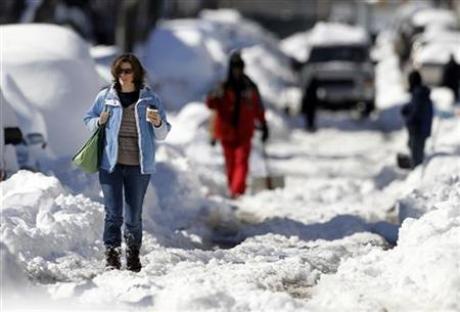More Americans Say Global Warming Exaggerated: Poll
Country: US
Author: Richard Cowan

A woman walks through heavy snow as she carries
her coffee on Capitol Hill in Washington, February 11, 2010.
Photo: Jason Reed
A growing number of Americans, nearly half the country, think global warming worries are exaggerated, as more people also doubt that scientific warnings of severe environmental fallout will ever occur, according to a new Gallup poll.
The new doubts come as President Barack Obama is pressuring the Congress to produce legislation significantly cutting smokestack emissions of carbon dioxide and other greenhouse gases blamed for climate change problems.
With congressional elections less than eight months away, many lawmakers are hesitant to take on a controversial energy and environment bill, especially if voter interest is waning.
Amid eroding public sentiment and in response to escalating attacks from global warming skeptics, the Union of Concerned Scientists on Thursday released a letter they said was signed by more than 2,000 climate scientists and economists, including some Nobel prize winners, urging the Senate to pass a bill.
"The strength of the science on climate change compels us to warn the nation about the growing risk of irreversible consequences ... as temperatures rise further, the scope and severity of global warming impacts will continue to accelerate," they wrote.
The Gallup poll, conducted March 4-7, indicates a reversal in public sentiment on an issue that not only involves the environment, but also economic and national security concerns.
Forty-eight percent of Americans now believe that the seriousness of global warming is exaggerated, up from 41 percent last year and 31 percent in 1997, when Gallup first asked the question.
The result comes on the heels of well-publicized reports that some of the details of scientific findings that went into international global warming reports were either flawed or exaggerated.
But supporters of an aggressive global effort to keep the Earth's temperatures from rising more than 2 degrees Celsius from pre-industrial levels argue that while scientists need to be more fastidious in their research, the overwhelming evidence supports the theory that a warming planet will lead to dangerous ice melting, flooding, drought, refugee problems and the spread of disease.
The United States has made a non-binding pledge to the world to seek a 17 percent reduction in carbon emissions by 2020, from 2005 levels, mostly by switching to more expensive alternative energy, such as wind and solar power.
But without legislation from Congress, that goal is unlikely to be met.
The Gallup poll of slightly more than 1,014 adults has a sampling error margin of plus or minus 4 percent.
A majority still believes global warming is real but that percentage is falling, with the average American now less convinced than at any time since 1997.
Thirty-five percent said in the latest poll that the effects of global warming either will never happen (19 percent) or will not happen in their lifetimes (16 percent). The 19 percent figure is more than double from 1997, Gallup said.
A growing number of Americans are doubting that global warming is related to human activities: 50 percent now blame human activities and 46 percent blame natural changes in the environment, such as fluctuations in the sun's intensity or the fallout from volcanic eruptions.
That compares with 61 percent and 33 percent respectively in 2003, Gallup said.
(Editing by Anthony Boadle)
© Thomson Reuters 2010 All rights reserved
